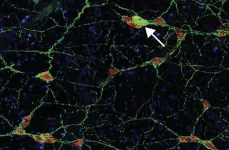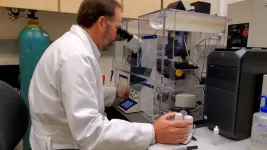(Press-News.org) It’s human nature to be judgmental. But why do we place less blame on someone, or give more praise, if we find out that person had a history of suffering in childhood? In a recent study, University of Missouri researchers discovered why someone’s childhood adversity influences how others judge their behavior.
The finding contributes to a growing body of evidence that suggests judgments of praise and blame are “asymmetrically sensitive” to certain types of information about someone’s life history, said Philip Robbins, associate professor and chair of the Department of Philosophy.
“In the case of negative or anti-social behavior, we see the actions of people with adverse childhood experiences as less of a reflection of their fundamental moral character, and more as a reflection of the environment they were raised in, so we blame them less for those actions,” Robbins said. “On the other hand, when someone has experienced adversity in childhood and does something good, we tend to think of that behavior as more reflective or expressive of who the person is deep down, so we praise them more for it.”
The research, based on statistical analysis of survey results from 248 participants, suggests that struggling with adversity in early life can be a “deformative experience,” reshaping an individual's moral development.
“Experiences deform people’s behavior in the sense that adverse experiences can pull people away from who they really are on a deeper level by pushing them onto an ‘alternative’ track of anti-sociality that they otherwise wouldn’t be on,” Robbins said.
The research conducted by Robbins and Fernando Alvear, a doctoral candidate in philosophy at MU, builds upon earlier work by Robbins and other colleagues, including Paul Litton, dean of the MU School of Law. Previously, Robbins and his colleagues found that people tend to think of a violent criminal as less culpable and less deserving of punishment when told that the accused had suffered serious harm in childhood. They also found that people tend to give more praise to someone for their good deeds as an adult after discovering that person had to overcome adversity or suffering earlier in life, such as abuse and neglect as a child.
The current study by Robbins and Alvear aimed to address a largely unanswered question from the earlier work about why this kind of information has this effect on people’s judgements.
“This has all sorts of implications for people’s social interactions,” Robbins said. “Moral judgment is tremendously important for how we relate to others as people because they form an essential part of social judgment. The current research is part of a larger project aimed at understanding how moral judgment works. This understanding could potentially reorient people’s thinking in ways that could have positive effects on the everyday practice of blaming and praising.”
Robbins believes there is a natural “track” for a person’s development, and people who haven’t experienced challenging life events, including loss, trauma or other social disadvantages, do not typically develop strong anti-social tendencies later in life.
“People generally learn to behave in morally appropriate ways toward other people, such as not hurting, harming or speaking ill of them,” Robbins said. “When people don’t learn these lessons, they are pulled off-track from the natural path of development. People may not be saints or heroes, but most of us aren’t villains either.”
In future work, Robbins plans to explore the role that gender stereotyping may play in determining how judgments of blame and praise are affected by information about a person’s life history.
“Deformative Experience: Explaining the Effects of Adversity on Moral Evaluation” is available online and is forthcoming at the journal Social Cognition.
Editor’s Note: The Department of Philosophy is in the MU College of Arts and Science.
END
Why childhood adversity impacts how a person’s behavior is judged
University of Missouri researchers uncover a new level of the complex relationship between life’s adversities and the formation of moral judgments.
2023-08-22
ELSE PRESS RELEASES FROM THIS DATE:
nTIDE August 2023 Deeper Dive: Employment landscape shifts to near all-time highs for people with disabilities
2023-08-22
East Hanover, August 22, 2023 — Since the COVID-19 pandemic, gains in the labor market for people with disabilities have been at near all-time highs. Expert speakers at last Friday’s nTIDE Deeper Dive Lunch & Learn Webinar provided results from an in-depth University of New Hampshire research study, which took a closer look at the unprecedented surge in employment-to-population ratio among most of the six disability subgroups identified by the U.S. Bureau of Labor Statistics (BLS). Possible driving factors behind this employment transformation were also explored.
nTIDE Deeper Dive Lunch & Learn Webinar is presented by Kessler Foundation ...
Steam condenser coating could save 460M tons of CO2 annually
2023-08-22
If coal and natural gas power generation were 2% more efficient, then, every year, there could be 460 million fewer tons of carbon dioxide released and 2 trillion fewer gallons of water used. A recent innovation to the steam cycle used in fossil fuel power generation could achieve this.
Researchers at the University of Illinois Urbana-Champaign have developed a coating for steam condensers used in fossil fuel steam-cycle generation that is made with fluorinated diamond-like carbon, or F-DLC. The researchers reported in the journal Nature Communications that this coating could boost the overall process efficiency ...
Study adds to evidence that Parkinson’s starts in the gut
2023-08-22
NEW YORK, NY--Ask any neurologist: Parkinson’s disease is a brain disorder. The conspicuous symptoms of Parkinson’s disease—uncontrollable tremors, slowed down motions, and the feeling that one’s feet are stuck to the ground—all stem from the loss of neurons in a region of the brain that helps control movement.
But many researchers believe that the neurodegenerative disorder may get started far away from the brain—in the gut—and years before the first neurological signs appear.
New findings by Columbia researchers David Sulzer, ...
Mapping methane emissions from rivers around globe reveals surprising sources
2023-08-22
Freshwater ecosystems account for half of global emissions of methane, a potent greenhouse gas that contributes to global warming. Rivers and streams, especially, are thought to emit a substantial amount of that methane, but the rates and patterns of these emissions at global scales remain largely undocumented.
An international team of researchers, including University of Wisconsin–Madison freshwater ecologists, has changed that with a new description of the global rates, patterns and drivers of methane emissions from ...
Neuroscientists create new resource to improve Alzheimer’s disease research models
2023-08-22
INDIANAPOLIS – A new study by Indiana University School of Medicine researchers uses more genetically diverse mouse models to study the accumulation and spread of abnormal tau protein deposits in the brain—a known sign of Alzheimer’s disease and several other neurodegenerative diseases. The study’s findings, recently published in the Journal of Experimental Medicine, could lead to better research models that improve understanding of how different genetic backgrounds influence neurodegenerative disease development and treatment needs.
“As ...
Glitter impairs growth of organisms with key roles in aquatic ecosystems, study shows
2023-08-22
A study conducted by researchers affiliated with the University of São Paulo (USP) in Brazil concluded that particles of glitter can hinder the growth of organisms at the base of aquatic ecosystems, such as cyanobacteria (blue-green algae), which play a key role in the biogeochemical cycles of water and soil, as well as being eaten by other organisms. An article on the study is published in the journal Aquatic Toxicology.
Ubiquitous in makeup, nail polish, holiday decorations, greeting cards, Carnival costumes and many other places, glitter sticks to skin and clothes and requires a lot of effort to remove. It is made up of microplastics, tiny particles ...
Mount Sinai study identifies most effective and safest outpatient labor induction methods, potentially reducing hospital stays and increasing hospital efficiency in use of resources
2023-08-22
Paper Title: Outpatient cervical ripening and labor induction with low-dose vaginal misoprostol reduces the interval to delivery: A systematic review and network meta-analysis
Journal: American Journal of Obstetrics and Gynecology, July 2023
Authors: Joanne L. Stone, MD, MSHCDL, Professor and System Chair of the Raquel and Jaime Gilinski Department of Obstetrics, Gynecology and Reproductive Science at the Icahn School of Medicine at Mount Sinai; Rachel Meislin, MD, Maternal-Fetal Medicine Fellow at Mount Sinai Hospital; and other coauthors.
Bottom Line: While prior research and analysis have evaluated methods of outpatient labor ...
NIH awards The Texas Heart Institute $1.14 million to develop a novel, first-in-class drug for atherosclerotic cardiovascular disease
2023-08-22
HOUSTON (Aug. 22, 2023) — The National Heart, Lung, and Blood Institute (NHLBI) recently awarded The Texas Heart Institute® (THI) a two-year, $1.14 million grant to develop a novel, first-in-class drug to treat cardiovascular disease (CVD) as a significant improvement to current treatment regimens — specifically for adverse events arising from atherosclerosis.
Cardiovascular disease is the leading cause of death worldwide, with the Centers for Disease Control and Prevention (CDC) estimating that one person dies from CVD every 33 seconds in the United States, accounting for one in every five deaths in 2021.
CVD leads to heart ...
UT Health San Antonio, 7 collaborators garner $46 million from NIH to move discoveries into practice
2023-08-22
SAN ANTONIO (Aug. 22, 2023) — The University of Texas Health Science Center at San Antonio (also called UT Health San Antonio) and seven regional collaborators will leverage $46 million from the National Institutes of Health (NIH) over the next five to seven years to translate scientific discoveries into therapeutic benefits for human health and well-being.
A key focus will be reducing health disparities among Mexican Americans, active military personnel and veterans.
William L. Henrich, ...
Automate or informate? Firms must invest in specific types of IT to improve working capital management
2023-08-22
The management of working capital — or a firm’s current assets minus its current liabilities — aids organizations in making efficient use of their existing assets and maximizing cash flow.
The relationship between efficient working capital management and firm performance can be complex due to globally dispersed supply chains, number of suppliers and product variety, and technological uncertainty, among other factors.
New research from the University of Notre Dame shows that information technology represents a critical investment that ...
LAST 30 PRESS RELEASES:
Trapping light on thermal photodetectors shatters speed records
New review highlights the future of tubular solid oxide fuel cells for clean energy systems
Pig farm ammonia pollution may indirectly accelerate climate warming, new study finds
Modified biochar helps compost retain nitrogen and build richer soil organic matter
First gene regulation clinical trials for epilepsy show promising results
Life-changing drug identified for children with rare epilepsy
Husker researchers collaborate to explore fear of spiders
Mayo Clinic researchers discover hidden brain map that may improve epilepsy care
NYCST announces Round 2 Awards for space technology projects
How the Dobbs decision and abortion restrictions changed where medical students apply to residency programs
Microwave frying can help lower oil content for healthier French fries
In MS, wearable sensors may help identify people at risk of worsening disability
Study: Football associated with nearly one in five brain injuries in youth sports
Machine-learning immune-system analysis study may hold clues to personalized medicine
A promising potential therapeutic strategy for Rett syndrome
How time changes impact public sentiment in the U.S.
Analysis of charred food in pot reveals that prehistoric Europeans had surprisingly complex cuisines
As a whole, LGB+ workers in the NHS do not experience pay gaps compared to their heterosexual colleagues
How cocaine rewires the brain to drive relapse
Mosquito monitoring through sound - implications for AI species recognition
UCLA researchers engineer CAR-T cells to target hard-to-treat solid tumors
New study reveals asynchronous land–ocean responses to ancient ocean anoxia
Ctenophore research points to earlier origins of brain-like structures
Tibet ASγ experiment sheds new light on cosmic rays acceleration and propagation in Milky Way
AI-based liquid biopsy may detect liver fibrosis, cirrhosis and chronic disease signals
Hope for Rett syndrome: New research may unlock treatment pathway for rare disorder with no cure
How some skills become second nature
SFU study sheds light on clotting risks for female astronauts
UC Irvine chemists shed light on how age-related cataracts may begin
Machine learning reveals Raman signatures of liquid-like ion conduction in solid electrolytes
[Press-News.org] Why childhood adversity impacts how a person’s behavior is judgedUniversity of Missouri researchers uncover a new level of the complex relationship between life’s adversities and the formation of moral judgments.



